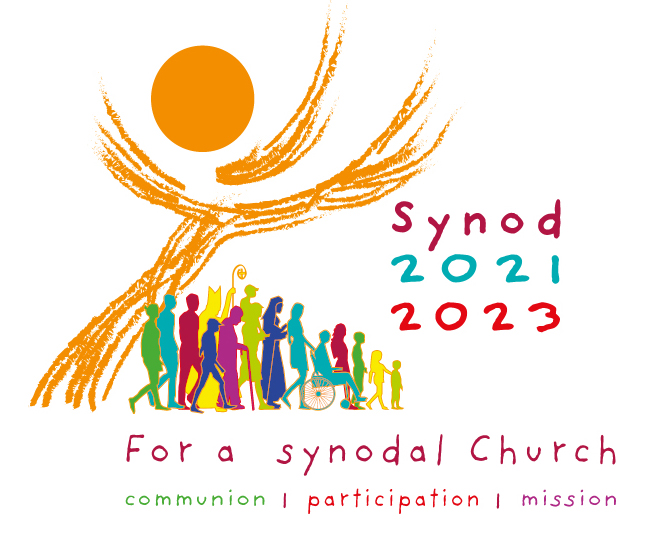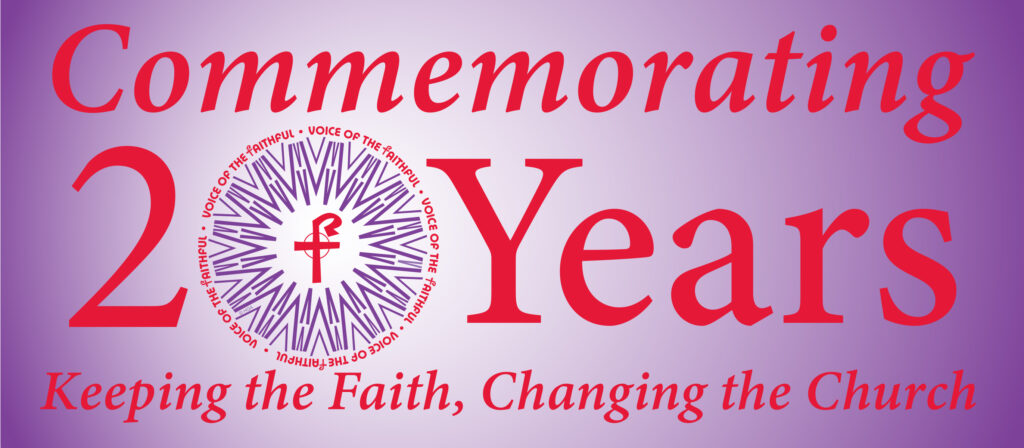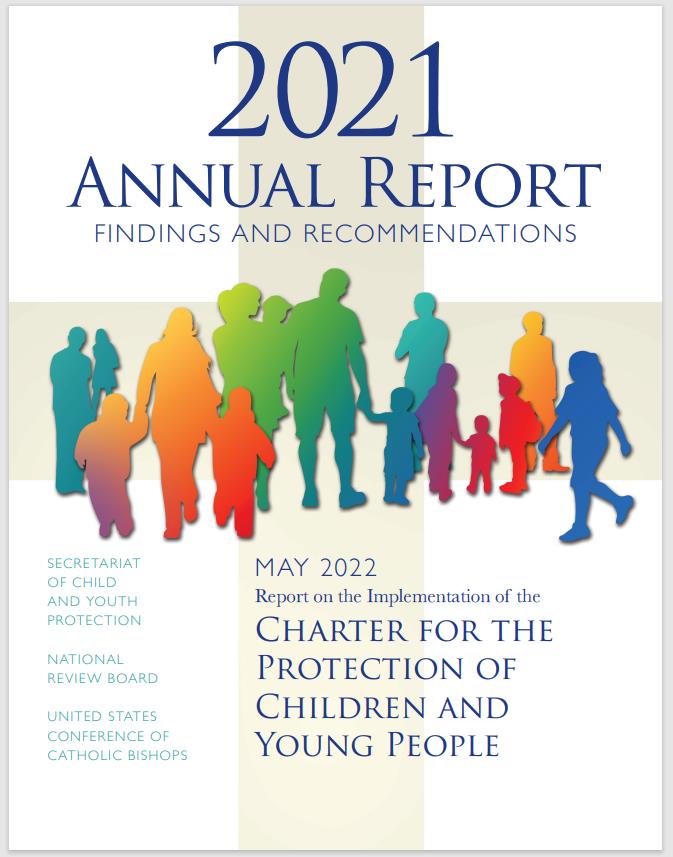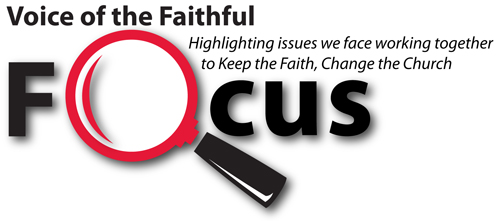
In the Vineyard :: August 15, 2022 :: Volume 22, Issue 15
National News
VOTF Synod Report

The culmination of our many Synod sessions January through May, distilled to the 10 pages the General Secretariat required, went to the Vatican last week. As promised, we sent it directly to the Secretariat to ensure that your voices would be represented among the lay voices seeking to be heard in the Synod for Synodality. We included in the report three appendices, as was also allowed, including one with three separate reports from diocesan groups who had asked us to please submit their reports with ours. In addition to our Synod Submission, an additional appendix will be ready shortly, with the hundreds of pages of scribe reports from the 45 sessions we held.
We thank you for raising your voices–not just those of you who spoke through us, but also the hundreds of you who attended Synod sessions in your own dioceses to ensure lay voices pursuing our mission and goals would be heard there.
We especially thank Bev Spencer, who devoted hours of time to tracking registrations, assigning each registrant to two session dates, making sure facilitators and scribes were assigned for each session, and helping deliver links and preparatory materials when needed, along with any lists needed to tabulate the reports. Thank you to our Executive Director, Donna B. Doucette, who handled all the registration downloads and provided the preparatory videos and slideshows for our Synod sessions, and to Nick Ingala, our Communications Director, who kept the Synod page fresh and fielded all the inquiries to the office.
We thank the committee that helped us put all the sessions together, from setting up the questions and formats to hosting pilot sessions: Chris & Ethel Doyle, Don Garbison, Karen James, Margaret Roylance, Susan Vogt, and Paul Welsh. Thanks also to Mary Pat Fox and Margaret Roylance who helped Donna condense the hundreds of responses into a 10-page summary. And thank you to every one of you who served as scribes and facilitators during the six months; your assistance was invaluable!
We have posted the Synod report on our Synod page, and we will add Appendix D with the scribe notes as soon as possible.
Join Us for VOTF’s 20th Year Commemoration

Please join us on Saturday, Oct. 29, 2022, at the Boston Marriott Hotel Newton, when our friends and supporters will gather (in person again!) to pray, learn, plan, and socialize–as a community–honoring our commitment, 20 years and continuing, to Keep the Faith, Change the Church. The venue is familiar to us for its good food, comfortable meeting space and accommodations, and generous room discount.
Prof. Thomas H. Groome, Ed.D., from Boston College will present an interactive keynote address called Putting Jesus at the Heart of Keeping the Faith and Changing Church. “I would like to spark people’s own thoughts about why Catholics often think of Church or Pope or Sacraments as the ‘heart’ of their faith and seldom Jesus,” Tom says. Dr. Groome’s work What Makes Education Catholic: Spiritual Foundations recently won the top award in the Religious Education category at the 2022 Catholic Media Association conference. In 2020, Tom received top place from the Catholic Press Association for his book Faith for the Heart: A Catholic Spirituality.
We will have our Synod update and report for you plus updates on the three major studies VOTF conducts: diocesan financial transparency and accountability, governance via Diocesan Finance Councils, and the first national analysis of all 177 dioceses and their child protection and Safe Environment practices. You also don’t want to miss a report on women’s roles and our collaborative work for greater input from the centuries-neglected half (and more) of the Church.
Added attractions: Special appearance by Dr. Phyllis Zagano, recognized worldwide as the premiere scholar on women deacons, will lead us in Grace before the luncheon and serve as acolyte for the closing Mass with Fr. Bill Clark, who led the benediction during our virtual conferences, and the Paulist Center Community Choir with Normand Gouin, renowned pastoral musician and composer.
Event: Voice of the Faithful 20th Year Commemoration
Date: Saturday, Oct. 29, 2022
Time: 9:30 a.m.-4 p.m. (Lunch included) P.S. It’s a delicious buffet.
Place: Boston Marriott Hotel Newton, 2345 Commonwealth Ave., Newton MA
A venue familiar to us for its good food, comfortable meeting
space and accommodations, and a generous room discount.
Click here for an agenda and more information.
The USCCB’s 2021 Annual Compliance “Audit”
By Patricia T. Gomez, Ph.D., Co-chair VOTF Protection of Children Group

USCCB has released its 2021 Annual Report: Findings & Recommendations on the Implementation of the Charter for the Protection of Children and Young People (aka Charter Compliance Audit). The USCCB Secretariat of Child and Youth Protection released the so-called audit on July 12, 2022. The Annual Audit Report aims to measure diocesan compliance with the USCCB Charter for the Protection of Children. The Charter was adopted in 2002 by the U.S. bishops following widespread reports of clergy abuse and has been revised in 2005, 2011, and 2018. The fourth revision is forthcoming.
This iteration of the annual report is based on the audit findings of StoneBridge Business Partners and is available for viewing (2021 Annual Report). Note that it is dated MAY 2022 and covers the audit year of July 1, 2020, through June 30, 2021.
This most recent audit reveals new cases of sexual misconduct by priests. Although there were few reports of new cases during this audit period, 30 new and substantiated allegations nationwide have been reported. Of the 30 new allegations involving minors, six were derived from four different dioceses. Nine other allegations are still under investigation; nine were unsubstantiated; five could not be proven; and one was referred to the provincial of a religious order. The Preface to the report indicates that offenders in substantiated allegations were removed from ministry and that “every” allegation was reported to law enforcement.
The number of allegations that are historical in nature still remained high during this audit period: 3,073. However, this number is 1,149 less than the number of historical allegations reported in the 2020 report. The victims of these historical allegations are now adults and their abuse occurred in decades past. Delayed disclosure of child sex abuse is a common phenomenon when survivors wait for years, even decades, before disclosing to others that they have been victims of childhood sexual abuse.
The 2021 Audit process had been modified because the 2020 Audit report found dysfunction in diocesan review boards (DRB). The new audit format allowed for gathering more information on Charter requirements for DRB membership, DRB composition, DRB functions, and scheduled meetings. This audit included interviews of all or most DRB members from dioceses and eparchies that were visited personally by the auditors.
Article 2 of the Charter requires lay-run review boards that function as a confidential consultative body to the bishop or eparch. There were four instances of noncompliance with Article 2 of the Charter in this report: the Diocese of Corpus Christi, TX; the Diocese of Lafayette, LA; the Diocese of New Ulm, MN; and the Eparchy of Newton.
These instances of noncompliance found in the 2021 Audit correspond with diocesan scores obtained on the 2022 VOTF Protection of Children Survey (VOTF POC Report 2022): Corpus Christi TX and Lafayette LA each received zero points in the DRB category; and New Ulm, MN received only 5 out of a possible 18 points in the category.
Auditors report that 192 dioceses and eparchies participated in the 2021 audit process but four did not participate. Although COVID-19 presented challenges to onsite visits, auditors completed 70 “onsite” audit visits: 35 dioceses were physically visited and 35 additional dioceses and eparchies were “visited” virtually. Data were collected from 122 other dioceses and eparchies and were included in this report.
Chapter 3 of this Report contains statistical survey data compiled by the Center for Applied Research in the Apostolate (CARA). One data set indicates a decrease of funds spent by dioceses and eparchies on costs related to allegations of clergy abuse for the fiscal year 2021. The grand total of those specific costs for fiscal year 2021 ($194,120,218 ) was 38% or $117,860,448 less than the grand total of those specific costs for fiscal year 2020 ($311,980,666).
StoneBridge Partners mentions additional child protection actions that can be taken by dioceses and eparchies that go beyond the specific requirements of the Charter. These include regular or “as needed” parish and school location audits by all dioceses and eparchies. The audit firm suggests the inclusion of visits and audits of parish and school during their onsite visits, especially within a diocese or eparchy that does not conduct their own audits. These actions would require instituting formal processes to periodically review documentation and compliance assessment with safe environment requirements. VOTF strongly supports the institution of formal diocesan and eparchial site visits to supplement the self-audit reports completed by parish and school locations.
Another suggestion found in the StoneBridge comments section in Chapter 2 of the Report calls for implementing a policy for renewal of safe environment training for all clergy, employees, and volunteers on a periodic basis. Such a policy change towards mandated, periodic abuse prevention training emphasizes the necessity for ongoing prevention training. Periodic re-training can provide new information regarding the protection of children that has been developed from the last time participants were trained. Also suggested by the auditors is to set a time frame for periodic background check renewals. The 2022 VOTF Child Protection Survey report suggests that this be an annual process to ensure capturing the most up-to-date background information on those working and volunteering with minors.
The Conclusion section in Chapter One comments on evidence that abuse prevention work and ministry must be ongoing to ensure youth safety and victim assistance. While many audit findings and comments indicate the need to bolster safe environments and child and youth protection efforts, the overall report does indicate progress and improvement in these efforts.
Responses to VOTF’s 2022 VOTF Child Protection Survey from dioceses and bishops have been encouraging in this regard. Many dioceses and eparchies continue to look for suggestions and resources that will improve child safety efforts. Online resources and support continue to be provided by the Secretarial of Child and Youth Protection to assist dioceses and eparchies in their ministry to victims and to bolster safe environment training and education.
Following Up on Some Synod Thoughts
While preparing the report from VOTF to the General Secretariat, we were struck by some comments heard again and again. One was “bad homilies.” Whether it was in describing parish experiences, objecting to political tirades, or commenting on priest formation, that judgment popped up over and over: bad homilies.
We can’t go back and retrain priests emerging from seminaries, and we probably can’t set up public speaking training centers or force the numerous bad homilists out there to take training in homiletics. But as lay people, we still have options. This recent article in America Magazine suggests six ways to help a homilist improve—take note of the tips in #s 4 and 5 especially. It’s worth a try!
Videos on Theological Imagination and Renewal
Videos of the speeches by Fr. Dan Horan and Cardinal Peter Turkson, presented at the recent 2022 Annual meeting of the Association of U.S. Catholic Priests (AUSCP) are now available. Fr. Horan’s presentation was titled “Dreaming With the Spirit; Theological Imagination and the Challenge of Pastoral Ministry Today”. The Question & Answer session that accompanied this presentation is available HERE.
Cardinal Peter Turkson’s 2022 Assembly presentation, Renewing rhe Spirit of Vatican II is Essential to Our Path to the Future, also is available.
International News
Germany’s Synodal Path Criticized in Vatican Statement

Germany’s synodal path was intended to restore trust in the Catholic Church in Germany following the publication of an abuse report in 2018, as well as involve laypeople more heavily in the day-to-day operations of the Church. However, the results of these discussions have been controversial–with some of that controversy generated by extremely conservative bishops in the U.S.
Theologians and laypeople alike in Germany have called for ordaining women as priests, dispensing with mandatory priestly celibacy, allowing married priests, permitting the laity to be more involved in the election of bishops, and declaring that same-sex marriage is not sinful. In response, last month, the Vatican released a statement cautioning against undermining church unity with these calls and reiterating that the synodal path does not have the authority to make changes to church doctrine or Catholic moral teaching. The statement chastised the German progressive movement, going so far as to say that it risked causing a schism in the universal Church, and that the movement “does not have the faculty to oblige bishops and the faithful to assume new forms of governance and new approaches to doctrine and morals.”
The statement came as a surprise to organizers of the synodal path, including the president of the German Bishops’ Conference. Bishop Georg Bätzing of Limburg and other organizers said that they were “astonished” at the rebuke from the Vatican and that they had hoped that these matters could be discussed in a more formal setting than the unsigned statement. While it did not bear Pope Francis’s signature, it could only have been issued under his approval, and the German Bishops’ Conference and Central Committee of German Catholics expressed “wonderment” in their joint statement, pointing to this communication as an example of the overall poor communication in the church and calling the statement “a source of astonishment for us.”
The German Church is not the world’s largest but is wealthier than the Vatican and thus wields outsized influence. Much of the funding for the German Catholic Church comes from Germany’s church taxation system.
The German Synodal Path reports will be submitted to the Vatican in 2023 as part of the Synod on Synodality, and calls for more inclusion overall. Those who have left the church for a variety of reasons, those “who are excluded from church offices or ministries,” including both women and married men, and those who “do not belong to the educated middle class,” including migrants and those living in or impacted by poverty feel marginalized and unwanted by the church. The overall message of listening to the faithful, “as well as to the signs of the times, is seen as the foundation of a synodal process.”
Topics that the report specifically called out for more attention included social justice, poverty, climate change, migration, peace issues, involvement in social media, and “topics related to sexuality,” such as contraception, abortion and same-sex marriage,” were all mentioned in the report. Those that participated in the synod wished for these topics to be discussed freely, rather than shrouded in secrecy and confusion. The report said that “theologians are afraid of having their teaching licenses revoked if they make nuanced, open statements,” and laypeople often “feel inferior to, and frequently not understood by, clerics and other people with a theological background in their ability to speak out and have their say.”
Suggestions as to how to involve laypeople in ministry included not only preaching by laypeople but also “a reform of the lectionary, services in simple language, a culture of welcome, a closing of the gap between the chancel and the congregation.” The report also detailed how participants wished for a change in attitude, particularly with regard to participation in church life, increased transparency, control and exercise of power, and detection and punishments for abuses of power. Participants wanted women to be given voting rights and be able to fully participate in the next step of the Synod on Synodality.
The report closed with a powerful quotation from a participant: in order to restore trust in the church, “the bishops need to take up a clear position on the pressing issues of our time, such as equal access for all baptized people to church offices, a reassessment of sexual morality, and a non-discriminatory approach to homosexual and queer people. Taking up a clear position also means speaking a language that people can understand and that does not hide behind convoluted wording. [Additionally,] there needs to be an unambiguous acceptance of responsibility; power needs to be taken under control; and an attempt made to make amends to the victims of sexual and spiritual abuse. [The church] can only be successful if it is possible for all faithful to assume responsibility and partake in decisions at parish and diocesan levels.”
For more information, please see here, here, and here. For an English translation of the report, please see here.
For VOTF’s position on women’s roles in the Church, please see here.
To read more about VOTF’s position on child protection, please see here.
For survivor support resources, please see here.
For VOTF’s position on clericalism, please see here.
You can read the VOTF Synod Submission here.
Abuse Scandals Continue, This Time in Portugal
Since January, a commission in Portugal has been collecting testimonies detailing child sexual abuses by Catholic clergy. Over 350 testimonies have been collected to date, and late last month, Portuguese prosecutors launched 10 inquiries to investigate the allegations. Portugal’s statute of limitations means that the majority of the allegations cannot be investigated, but the commission submitted 17 accusations that were still eligible to be pursued to public prosecutors. Seven were in process and three were dismissed because they either lacked evidence, had already been investigated, or were too old. A Portuguese newspaper reported that Cardinal Manuel Clemente was aware of an allegation of sexual abuse that occurred in the 1990s and met with the victim 20 years later but did not inform authorities or remove the priest from his position. He said in a statement that he was “fully available” to help “find the truth” in the matter and confirmed he had received the complaint but denied any cover-up. He urged victims to come forward and speak to the committee.
Last week, another newspaper reported that one priest told two of his superiors about 12 colleagues that he suspected of child abuse, but the bishops did not report the allegations to police, and half of those colleagues remain in active ministry.
The committee’s role is not to prosecute sexual abuses, but to study the events that occurred and pass the results to public prosecutors. At the beginning of August, the Archbishop of Lisbon discussed “events in recent weeks that have marked the life of the Church in Portugal,” in a private audience at the Vatican. No further details were released, as the Vatican does not describe the topics of private audiences, but public suspicions as to the topics of conversation immediately fell on the sexual abuse allegations and the commission’s investigation.
For more information, please see here and here.
To read more about VOTF’s position on child protection, please see here.
For survivor support resources, please see here.

TOP STORIES
Detroit Catholic bishop halts public ministry after accusation he sexually assaulted boy
“A lawsuit filed this week alleges a Catholic bishop in Detroit who previously was a Vatican ambassador sexually assaulted a 12-year-old boy 25 times decades ago in Massachusetts. According to the suit filed Monday (Aug. 1) in Boston, Archbishop Paul Fitzpatrick Russell, 63, currently one of five auxiliary bishops in the Archdiocese of Detroit, raped the boy while Russell was a priest in the Archdiocese of Boston from 1989 to 1990. Pope Francis appointed Russell, formerly the Vatican’s ambassador to Turkey and Taiwan, to be a Detroit bishop in May and he assumed office last month.” By Niraj Warikoo, Detroit Free Press
- Archbishop Paul Russell, auxiliary in Detroit, ‘shocked and saddened’ by allegations of sexual abuse while a priest in Boston, By Catholic News Service on TheDialog.org
Group’s report card shows many dioceses failing in financial transparency
“Before Voice of the Faithful prepared a report on diocesan finance councils, it gave dioceses a heads-up that it would be working on such a report and what it would be looking for when it visited the dioceses’ websites. The Massachusetts-based organization sent letters to diocesan bishops and chief financial officers of the 176 U.S. Latin-rite dioceses. Despite the advance notice, only 18 of the 176 dioceses got a grade of 60% or better — what the Voice of the Faithful considered a passing grade when it released the report July 13.” By Mark Pattison, Catholic News Service, on AngelusNews.com
- Group’s report card shows many dioceses failing in financial transparency, By Mark Pattison, Catholic News Service, in National Catholic Reporter
Church must undergo profound reform to survive, says French sociologist
“The Catholic Church may be at a turning point in its history, believes Danièle Hervieu-Léger, a leading French sociologist on religion. To survive in secularized Western societies, the institution will have to reform itself, she says. In a new book with fellow sociologist Jean-Louis Schlegel that came out this past spring, ‘Vers l’implosion? Entretiens sur le présent et l’avenir du catholicisme (‘Toward Implosion: Interviews on the Present and the Future of Catholicism’), she dissects the causes of the current model and suggests possible changes. The book has been generally well received in France.” By Catholic News Service on Cruxnow.com
Click here to read the rest of this issue of Focus …
Pope Francis Focuses on Small Businesses for August
The Pope released his monthly prayer intention on Tuesday in a video prepared by the Pope’s Worldwide Prayer Network.
In the message, he recognizes the “courage, effort and sacrifice” of small and medium-sized entrepreneurs, and acknowledges that they are among the most affected by “the grave socio-economic crisis,” brought to new heights by wars and the devastating Covid-19 pandemic.
According to statistics for 2021 from the World Bank, one in four companies lost half of their volume of sales because of the global pandemic. Further exacerbating their reality is that they do not receive adequate public assistance.
To read more, click here.
Have an Eye for Details and a Few Hours per Month to Help?
The VOTF National Office is seeking a person to reconcile all credit card and online donations. The job involves a commitment of around two to three hours once a month. Activities include recording paper transactions in the appropriate Logs, producing Reconciliation Reports, and matching up the paper transactions and transaction lists with the Reconciliation Reports. Filing of original records and Reconciliation Reports is also required. The task requires great attention to detail. Assistance will be provided during the reconciliation process.
The job must be performed on-site, in the Needham MA area. You will be working among staff and volunteers who all are vaccinated and boostered.
Please send a brief description of your qualifications to Database Supervisor, P.O. Box 920408, Needham MA 02492. We need you!
Comments?
Please send them to Siobhan Carroll, Vineyard Editor, at Vineyard@votf.org. Unless otherwise indicated, I will assume comments can be published as Letters to the Editor.
Reminder: Please notify office@votf.org if you change your email address
